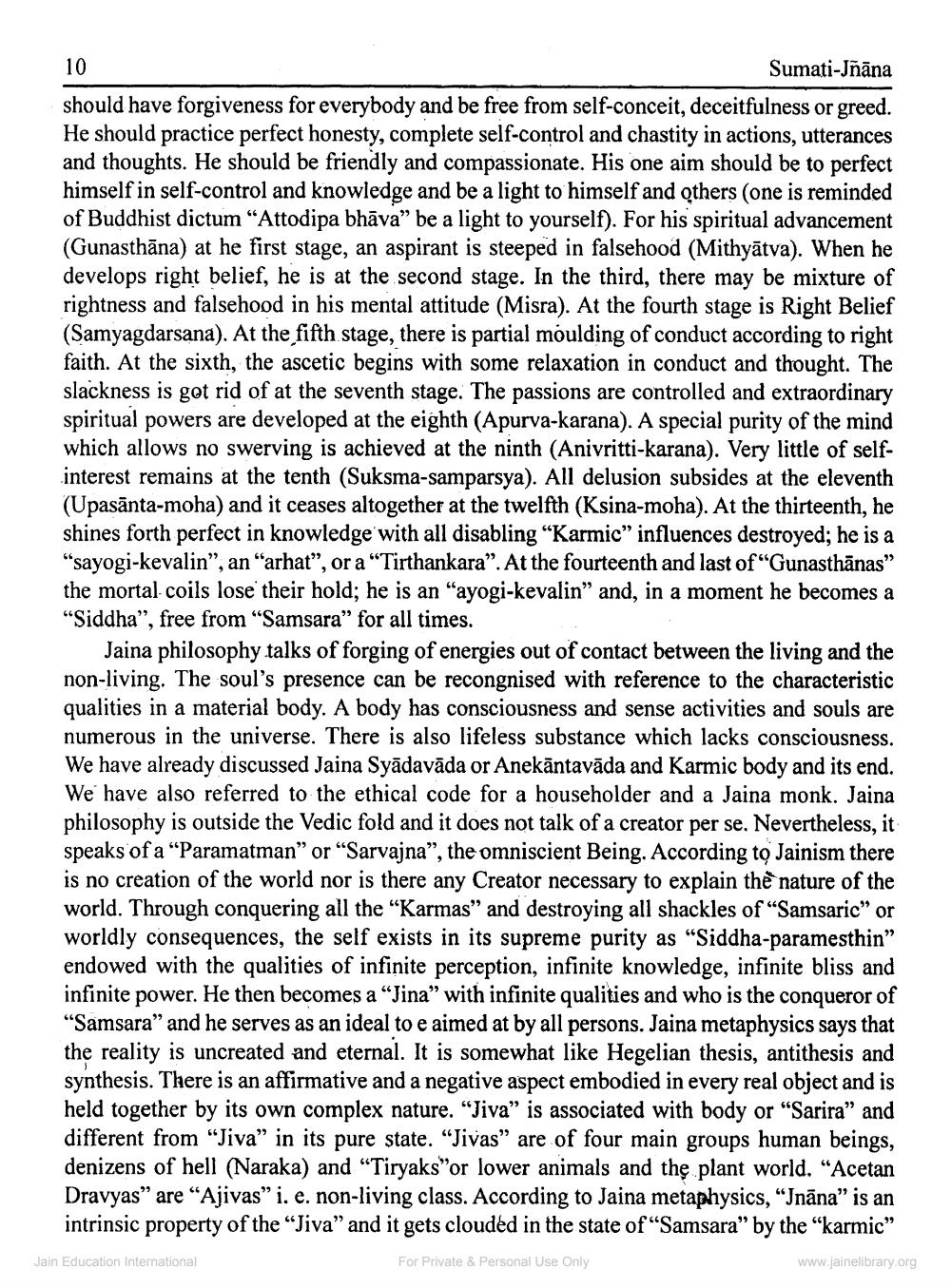________________
10
Sumati-jñāna should have forgiveness for everybody and be free from self-conceit, deceitfulness or greed. He should practice perfect honesty, complete self-control and chastity in actions, utterances and thoughts. He should be friendly and compassionate. His one aim should be to perfect himself in self-control and knowledge and be a light to himself and others (one is reminded of Buddhist dictum "Attodipa bhāva” be a light to yourself). For his spiritual adva (Gunasthāna) at he first stage, an aspirant is steeped in falsehood (Mithyātva). When he develops right belief, he is at the second stage. In the third, there may be mixture of rightness and falsehood in his mental attitude (Misra). At the fourth stage is Right Belief (Samyagdarsana). At the fifth stage, there is partial moulding of conduct according to right faith. At the sixth, the ascetic begins with some relaxation in conduct and thought. The slackness is got rid of at the seventh stage. The passions are controlled and extraordinary spiritual powers are developed at the eighth (Apurva-karana). A special purity of the mind which allows no swerving is achieved at the ninth (Anivritti-karana). Very little of selfinterest remains at the tenth (Suksma-samparsya). All delusion subsides at the eleventh (Upasānta-moha) and it ceases altogether at the twelfth (Ksina-moha). At the thirteenth, he shines forth perfect in knowledge with all disabling “Karmic" influences destroyed; he is a "sayogi-kevalin”, an "arhat”, or a “Tirthankara”. At the fourteenth and last of “Gunasthānas" the mortal-coils lose their hold; he is an "ayogi-kevalin" and, in a moment he becomes a "Siddha", free from “Samsara” for all times.
Jaina philosophy talks of forging of energies out of contact between the living and the non-living. The soul's presence can be recongnised with reference to the characteristic qualities in a material body. A body has consciousness and sense activities and souls are numerous in the universe. There is also lifeless substance which lacks consciousness. We have already discussed Jaina Syādavāda or Anekāntavāda and Karmic body and its end. We have also referred to the ethical code for a householder and a Jaina monk. Jaina philosophy is outside the Vedic fold and it does not talk of a creator per se. Nevertheless, it speaks of a “Paramatman” or “Sarvajna”, the omniscient Being. According to Jainism there is no creation of the world nor is there any Creator necessary to explain the nature of the world. Through conquering all the "Karmas" and destroying all shackles of “Samsaric" or worldly consequences, the self exists in its supreme purity as "Siddha-paramesthin" endowed with the qualities of infinite perception, infinite knowledge, infinite bliss and infinite power. He then becomes a “Jina" with infinite qualities and who is the conqueror of "Samsara" and he serves as an ideal to e aimed at by all persons. Jaina metaphysics says that the reality is uncreated and eternal. It is somewhat like Hegelian thesis, antithesis and synthesis. There is an affirmative and a negative aspect embodied in every real object and is held together by its own complex nature. “Jiva" is associated with body or "Sarira" and different from "Jiva" in its pure state. "Jivas” are of four main groups human beings, denizens of hell (Naraka) and “Tiryaks”or lower animals and the plant world. "Acetan Dravyas” are “Ajivas” i. e. non-living class. According to Jaina metaphysics, “Jnāna” is an intrinsic property of the "Jiva" and it gets clouded in the state of “Samsara" by the "karmic"
Jain Education International
For Private & Personal Use Only
www.jainelibrary.org




